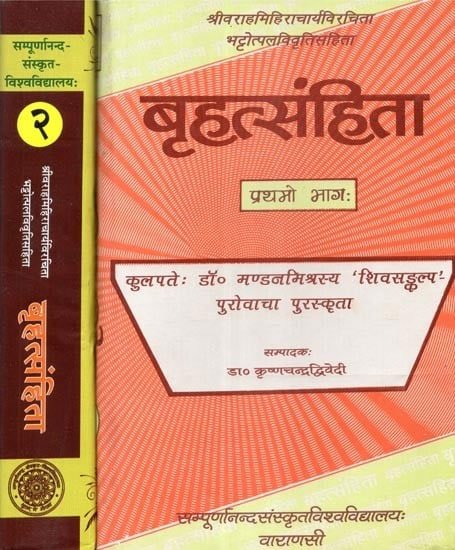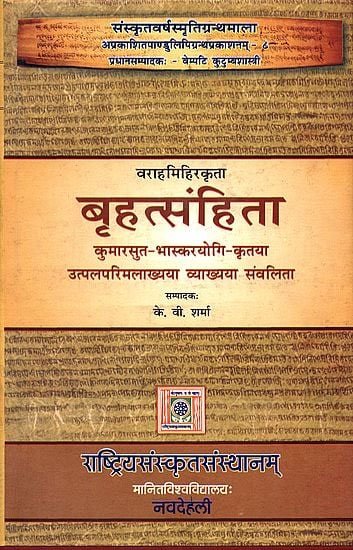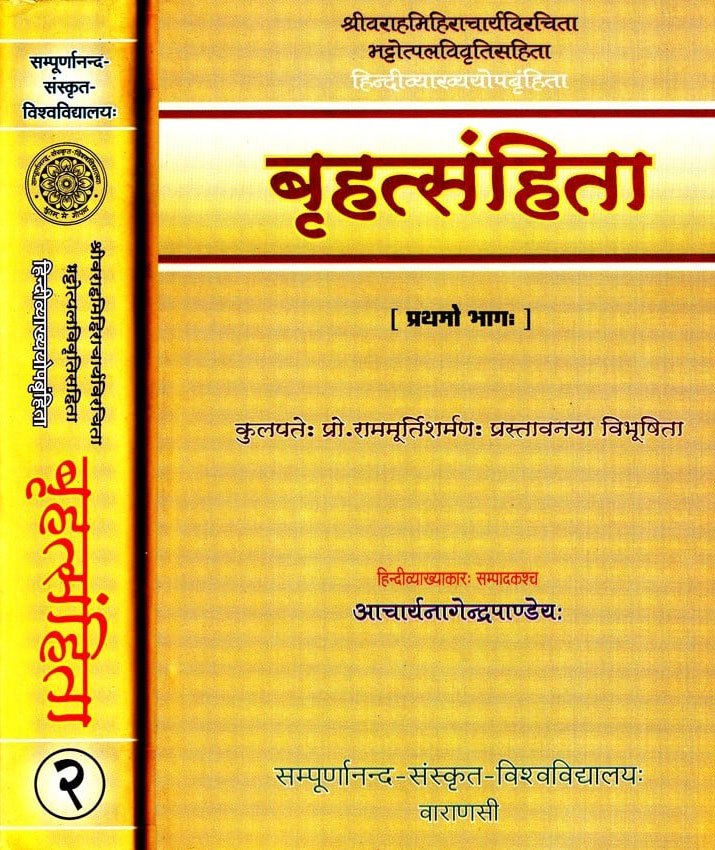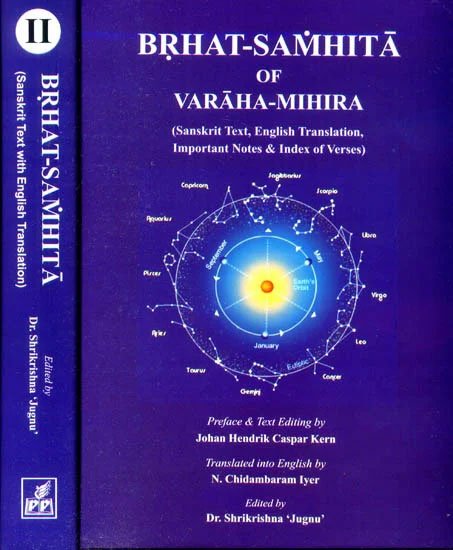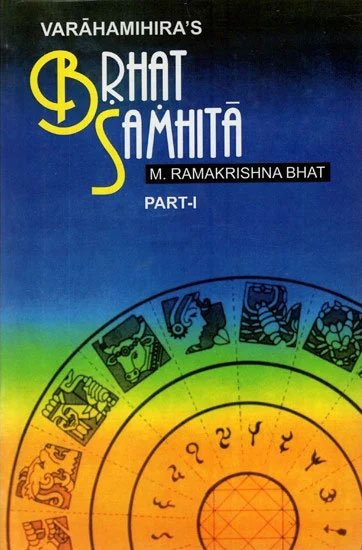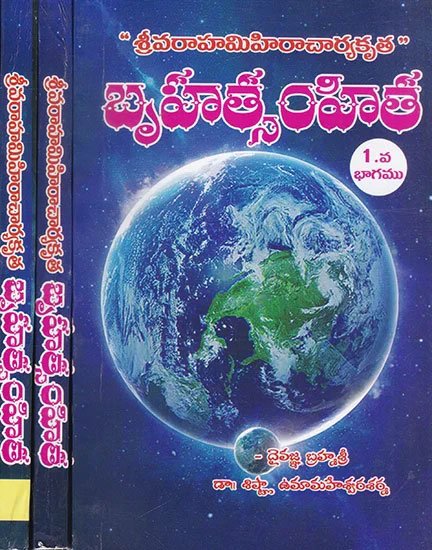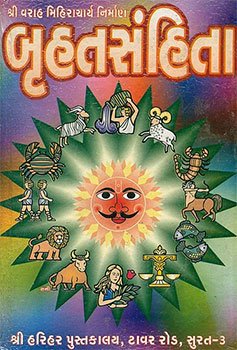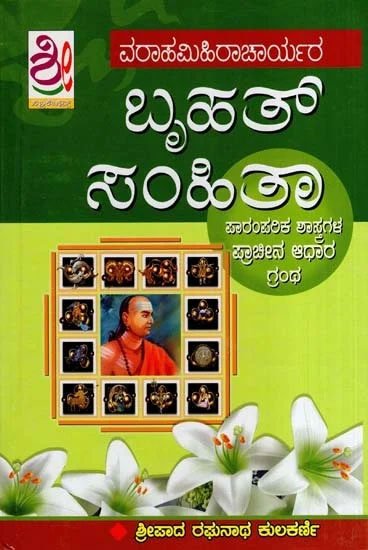Brihat-samhita [sanskrit]
26,560 words
The Sanskrit text of the Brihat-samhita from the 6th-century authored by Varaha Mihira in present-day Ujjain, India. It primarily deals with astrology and astronomy but is presented as an encyclopedia of knowledge.
Verse 28.14
वल्लीनां गगनतलोन्मुखाः प्रवालाः ।
स्नायन्ते यदि जलपांशुभिर्विहङ्गाः ।
सेवन्ते यदि च सरीसृपास्तृणाग्राण्य् ।
आसन्नो भवति तदा जलस्य पातः ।
मयूरशुकचाषचातकसमानवर्णा यदा ।
जपाकुसुमपङ्कजद्युतिमुषश्च सन्ध्याघनाः ।
जलोर्मिनगनक्रकच्छपवराहमीनोपमाः ।
प्रभूतपुटसंचया न तु चिरेण यच्छन्त्यपः ॥ १४ ॥
vallīnāṃ gaganatalonmukhāḥ pravālāḥ |
snāyante yadi jalapāṃśubhirvihaṅgāḥ |
sevante yadi ca sarīsṛpāstṛṇāgrāṇy |
āsanno bhavati tadā jalasya pātaḥ |
mayūraśukacāṣacātakasamānavarṇā yadā |
japākusumapaṅkajadyutimuṣaśca sandhyāghanāḥ |
jalorminaganakrakacchapavarāhamīnopamāḥ |
prabhūtapuṭasaṃcayā na tu cireṇa yacchantyapaḥ || 14 ||
The Sanskrit text of Verse 28.14 is contained in the book Brihata Samhita (Sanskrit Text with Hindi Translation) by Pandit Achyutananda Jha. This book is available online or you could buy the latest edition:
Read online Buy now! The Sanskrit text by Pandit Achyutananda Jha (2001)
Glossary of Sanskrit terms
Note: This extracts Sanskrit terms and links to English definitions from the glossary, based on an experimental segmentation of verse (28.14). Some terms could be superfluous while some might not be mentioned. Click on the word to show English definitions.
Valli, Gaganatala, Unmukha, Pravala, Yadi, Yad, Jala, Pamshu, Vihanga, Asanna, Bhavati, Bhavat, Bhavant, Tada, Patri, Pata, Pat, Mayura, Shuka, Casha, Cataka, Samanavarna, Yada, Japakusuma, Pankaja, Dyuti, Ush, Usha, Ushas, Sandhi, Sandhya, Aghana, Urmin, Akra, Kacchapa, Varaha, Mas, Prabhuta, Puta, Sancaya, Cirena, Cira, Yacchat, Yacchanti, Apas,
Analysis of Sanskrit grammar
Note: this is an experimental feature and only shows the first possible analysis of the Sanskrit text (Verse 28.14). If the system was successful in segmenting the sentence, you will see of which words it is made up of, generally consisting of Nouns, Pronouns, Verbs, Participles and Indeclinables. Click on the link to show all possible derivations of the word.
- Line 1: “vallīnāṃ gaganatalonmukhāḥ pravālāḥ ”
- vallīnām -
-
valli (noun, feminine)[genitive plural]vallī (noun, feminine)[genitive plural]
- gaganatalo -
-
gaganatala (noun, neuter)[compound], [vocative single]
- unmukhāḥ -
-
unmukha (noun, masculine)[nominative plural], [vocative plural]
- pravālāḥ -
-
pravāla (noun, masculine)[nominative plural], [vocative plural]
- Line 2: “snāyante yadi jalapāṃśubhirvihaṅgāḥ ”
- snāyante -
-
√snai (verb class 1)[present middle third plural]
- yadi -
-
yadi (indeclinable conjunction)[indeclinable conjunction]yadi (indeclinable relative)[indeclinable relative]yadi (indeclinable)[indeclinable]yad (noun, masculine)[locative single]
- jala -
-
jala (noun, masculine)[compound], [vocative single]jala (noun, neuter)[compound], [vocative single]√jal (verb class 1)[imperative active second single]
- pāṃśubhir -
-
pāṃśu (noun, masculine)[instrumental plural]pāṃśu (noun, feminine)[instrumental plural]pāṃśu (noun, neuter)[instrumental plural]
- vihaṅgāḥ -
-
vihaṅga (noun, masculine)[nominative plural], [vocative plural]vihaṅgā (noun, feminine)[nominative plural], [vocative plural], [accusative plural]
- Line 3: “sevante yadi ca sarīsṛpāstṛṇāgrāṇy ”
- sevante -
-
√sev (verb class 1)[present middle third plural]
- yadi -
-
yadi (indeclinable conjunction)[indeclinable conjunction]yadi (indeclinable relative)[indeclinable relative]yadi (indeclinable)[indeclinable]yad (noun, masculine)[locative single]
- ca -
-
ca (indeclinable conjunction)[indeclinable conjunction]ca (noun, masculine)[compound], [vocative single]ca (noun, neuter)[compound], [vocative single]
- Cannot analyse sarīsṛpāstṛṇāgrāṇy
- Line 4: “āsanno bhavati tadā jalasya pātaḥ ”
- āsanno* -
-
āsanna (noun, masculine)[nominative single]
- bhavati -
-
bhavatī (noun, feminine)[adverb], [vocative single]bhavat (noun, masculine)[locative single]bhavat (noun, neuter)[locative single]bhavant (pronoun, masculine)[locative single]bhavant (pronoun, neuter)[locative single]√bhū (verb class 1)[present active third single]
- tadā* -
-
tadā (noun, feminine)[nominative plural], [vocative plural], [accusative plural]tada (noun, masculine)[nominative plural], [vocative plural]
- jalasya -
-
jala (noun, masculine)[genitive single]jala (noun, neuter)[genitive single]
- pātaḥ -
-
pātṛ (noun, masculine)[vocative single]pāta (noun, masculine)[nominative single]pāt (noun, masculine)[accusative plural], [ablative single], [genitive single]√pā -> pāt (participle, masculine)[accusative plural from √pā class 2 verb], [ablative single from √pā class 2 verb], [genitive single from √pā class 2 verb]√pā -> pāt (participle, neuter)[ablative single from √pā class 2 verb], [genitive single from √pā class 2 verb]√pā -> pāt (participle, masculine)[accusative plural from √pā class 2 verb], [ablative single from √pā class 2 verb], [genitive single from √pā class 2 verb]√pā -> pāt (participle, neuter)[ablative single from √pā class 2 verb], [genitive single from √pā class 2 verb]√pā (verb class 2)[present active third dual]√pā (verb class 2)[present active third dual]
- Line 5: “mayūraśukacāṣacātakasamānavarṇā yadā ”
- mayūra -
-
mayūra (noun, masculine)[compound], [vocative single]mayūra (noun, neuter)[compound], [vocative single]
- śuka -
-
śuka (noun, masculine)[compound], [vocative single]śuka (noun, neuter)[compound], [vocative single]
- cāṣa -
-
cāṣa (noun, masculine)[compound], [vocative single]cāṣa (noun, neuter)[compound], [vocative single]
- cātaka -
-
cātaka (noun, masculine)[compound], [vocative single]
- samānavarṇā* -
-
samānavarṇa (noun, masculine)[nominative plural], [vocative plural]samānavarṇā (noun, feminine)[nominative plural], [vocative plural], [accusative plural]
- yadā -
-
yadā (indeclinable adverb)[indeclinable adverb]yadā (indeclinable relative)[indeclinable relative]yadā (indeclinable)[indeclinable]yad (noun, masculine)[instrumental single]
- Line 6: “japākusumapaṅkajadyutimuṣaśca sandhyāghanāḥ ”
- japākusuma -
-
japākusuma (noun, masculine)[compound], [vocative single]japākusuma (noun, neuter)[compound], [vocative single]
- paṅkaja -
-
paṅkaja (noun, masculine)[compound], [vocative single]paṅkaja (noun, neuter)[compound], [vocative single]
- dyutim -
-
dyuti (noun, feminine)[accusative single]dyuti (noun, masculine)[accusative single]
- uṣaś -
-
uṣas (noun, feminine)[compound], [vocative single]uṣas (noun, neuter)[compound], [nominative single], [vocative single], [accusative single]uṣ (noun, feminine)[nominative plural], [vocative plural], [accusative plural], [ablative single], [genitive single]uṣa (noun, masculine)[nominative single]
- ca -
-
ca (indeclinable conjunction)[indeclinable conjunction]ca (noun, masculine)[compound], [vocative single]ca (noun, neuter)[compound], [vocative single]
- sandhyā -
-
sandhya (noun, masculine)[compound], [vocative single]sandhya (noun, neuter)[compound], [vocative single]sandhi (noun, feminine)[instrumental single]sandhyā (noun, feminine)[nominative single]
- aghanāḥ -
-
aghana (noun, masculine)[nominative plural], [vocative plural]aghanā (noun, feminine)[nominative plural], [vocative plural], [accusative plural]
- Line 7: “jalorminaganakrakacchapavarāhamīnopamāḥ ”
- jalo -
-
jala (noun, masculine)[compound], [vocative single]jala (noun, neuter)[compound], [vocative single]jalā (noun, feminine)[nominative single]√jal (verb class 1)[imperative active second single]
- ūrmin -
-
ūrmin (noun, masculine)[vocative single]ūrmin (noun, neuter)[vocative single]
- agan -
-
√gam (verb class 1)[aorist active second single], [aorist active third single]√gam (verb class 2)[imperfect active second single], [imperfect active third single], [aorist active second single], [aorist active third single]√gam (verb class 3)[aorist active second single], [aorist active third single]
- akra -
-
akra (noun, masculine)[compound], [vocative single]akra (noun, neuter)[compound], [vocative single]
- kacchapa -
-
kacchapa (noun, masculine)[compound], [vocative single]
- varāham -
-
varāha (noun, masculine)[adverb], [accusative single]varāhā (noun, feminine)[adverb]
- īn -
-
i (noun, masculine)[accusative plural]
- opa -
-
- māḥ -
-
ma (noun, masculine)[nominative plural], [vocative plural]mā (noun, feminine)[nominative plural], [vocative plural], [accusative plural]mās (noun, masculine)[nominative single]
- Line 8: “prabhūtapuṭasaṃcayā na tu cireṇa yacchantyapaḥ ”
- prabhūta -
-
prabhūta (noun, masculine)[compound], [vocative single]prabhūta (noun, neuter)[compound], [vocative single]
- puṭa -
-
puṭa (noun, masculine)[compound], [vocative single]puṭa (noun, neuter)[compound], [vocative single]√puṭ (verb class 6)[imperative active second single]
- sañcayā* -
-
sañcaya (noun, masculine)[nominative plural], [vocative plural]
- na -
-
na (indeclinable particle)[indeclinable particle]na (noun, masculine)[compound], [vocative single]na (noun, neuter)[compound], [vocative single]
- tu -
-
tu (indeclinable particle)[indeclinable particle]
- cireṇa -
-
cireṇa (indeclinable)[indeclinable]cira (noun, masculine)[instrumental single]cira (noun, neuter)[instrumental single]
- yacchantya -
-
√yam -> yacchat (participle, neuter)[nominative dual from √yam class 1 verb], [nominative plural from √yam class 1 verb], [vocative dual from √yam class 1 verb], [vocative plural from √yam class 1 verb], [accusative dual from √yam class 1 verb], [accusative plural from √yam class 1 verb]√yam -> yacchantī (participle, feminine)[nominative single from √yam class 1 verb], [vocative single from √yam class 1 verb]√yam (verb class 1)[present active third plural]
- apaḥ -
-
apas (noun, feminine)[compound], [vocative single]apas (noun, masculine)[compound], [vocative single]apas (noun, neuter)[compound], [nominative single], [vocative single], [accusative single]ap (noun, feminine)[accusative plural]ap (noun, neuter)[ablative single], [genitive single]
Other editions:
Also see the following editions of the Sanskrit text or (alternative) English translations of the Verse 28.14
Brhatsamhita with the Commentary of Bhattotpala
by Krishna Chandra Dwivedi (2016)
Publisher: Sampurnanand Sanskrit University; 1229 pages;
Buy now!
Brihat Samhita with the Commentary of Utpalapatimala of Yogisvara
by K. V. Sharma (2012)
Publisher: Rashtriya Sanskrit Sansthan, Janakpuri; 754 pages; ISBN-10; 8186111360; ISBN-13: 9788186111369
Buy now!
Brihat Samhita (Hindi Translation)
by K. V. Sharma (2002)
Publisher: Sampurnanand Sanskrit University; 2359 pages; ISBN-13: 9789387890008.
Buy now!
Brhat Samhita (English translation)
by N. Chidambaram Iyer (2022)
Publisher: Parimal Publication Pvt. Ltd.; 801 pages; Edited by Dr. Shrikrishna Jugnu; ISBN-10: 8171104215; ISBN-13: 9788171104215.
Buy now!
Brhat Samhita (English with notes)
by M. Ramakrishna Bhat (2010)
Publisher: Motilal Banarsidas Publishers Pvt. Ltd.; 1155 pages; ISBN-10: 8120810600; ISBN-13: 9788120810600.
Buy now!
Brhat Samhita (Telugu translation)
by Sishtla Umamaheswara Sharma (2020)
Publisher: Mohan Publications, Andhra Pradesh; 846 pages.
Buy now!Preview of verse 28.14 in Kannada sript:
ವಲ್ಲೀನಾಂ ಗಗನತಲೋನ್ಮುಖಾಃ ಪ್ರವಾಲಾಃ ।
ಸ್ನಾಯನ್ತೇ ಯದಿ ಜಲಪಾಂಶುಭಿರ್ವಿಹಙ್ಗಾಃ ।
ಸೇವನ್ತೇ ಯದಿ ಚ ಸರೀಸೃಪಾಸ್ತೃಣಾಗ್ರಾಣ್ಯ್ ।
ಆಸನ್ನೋ ಭವತಿ ತದಾ ಜಲಸ್ಯ ಪಾತಃ ।
ಮಯೂರಶುಕಚಾಷಚಾತಕಸಮಾನವರ್ಣಾ ಯದಾ ।
ಜಪಾಕುಸುಮಪಙ್ಕಜದ್ಯುತಿಮುಷಶ್ಚ ಸನ್ಧ್ಯಾಘನಾಃ ।
ಜಲೋರ್ಮಿನಗನಕ್ರಕಚ್ಛಪವರಾಹಮೀನೋಪಮಾಃ ।
ಪ್ರಭೂತಪುಟಸಂಚಯಾ ನ ತು ಚಿರೇಣ ಯಚ್ಛನ್ತ್ಯಪಃ ॥ ೧೪ ॥
Brhat Samhita (Gujarati translation)
by - (2000)
Publisher: Shree Harihar Pustakalay, Surat; Author: Shri Varahamihira Acharya (શ્રી વરાહમિહીરાચાર્ય); 432 pages.
Buy now!Preview of verse 28.14 in Gujarati sript:
વલ્લીનાં ગગનતલોન્મુખાઃ પ્રવાલાઃ ।
સ્નાયન્તે યદિ જલપાંશુભિર્વિહઙ્ગાઃ ।
સેવન્તે યદિ ચ સરીસૃપાસ્તૃણાગ્રાણ્ય્ ।
આસન્નો ભવતિ તદા જલસ્ય પાતઃ ।
મયૂરશુકચાષચાતકસમાનવર્ણા યદા ।
જપાકુસુમપઙ્કજદ્યુતિમુષશ્ચ સન્ધ્યાઘનાઃ ।
જલોર્મિનગનક્રકચ્છપવરાહમીનોપમાઃ ।
પ્રભૂતપુટસંચયા ન તુ ચિરેણ યચ્છન્ત્યપઃ ॥ ૧૪ ॥
Brhat Samhita (Kannada translation)
by Sripada Raghunatha Kulkarni (2021)
Publisher: Srinidhi Publications, Bangalore; 668 pages with illustrations.
Buy now!Preview of verse 28.14 in Kannada sript:
ವಲ್ಲೀನಾಂ ಗಗನತಲೋನ್ಮುಖಾಃ ಪ್ರವಾಲಾಃ ।
ಸ್ನಾಯನ್ತೇ ಯದಿ ಜಲಪಾಂಶುಭಿರ್ವಿಹಙ್ಗಾಃ ।
ಸೇವನ್ತೇ ಯದಿ ಚ ಸರೀಸೃಪಾಸ್ತೃಣಾಗ್ರಾಣ್ಯ್ ।
ಆಸನ್ನೋ ಭವತಿ ತದಾ ಜಲಸ್ಯ ಪಾತಃ ।
ಮಯೂರಶುಕಚಾಷಚಾತಕಸಮಾನವರ್ಣಾ ಯದಾ ।
ಜಪಾಕುಸುಮಪಙ್ಕಜದ್ಯುತಿಮುಷಶ್ಚ ಸನ್ಧ್ಯಾಘನಾಃ ।
ಜಲೋರ್ಮಿನಗನಕ್ರಕಚ್ಛಪವರಾಹಮೀನೋಪಮಾಃ ।
ಪ್ರಭೂತಪುಟಸಂಚಯಾ ನ ತು ಚಿರೇಣ ಯಚ್ಛನ್ತ್ಯಪಃ ॥ ೧೪ ॥
![Brihat-samhita [sanskrit] - book cover](/uploads/a/Brihat-Samhita-Sanskrit.jpg)
